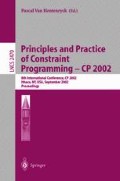Abstract
Model-based applications in engineering, such as diagnosis, configuration or interactive decision-support systems, require embedded constraint solvers with challenging capabilities. Not only consistency checking and solving, but also the computation of (minimal) conflicts and explanations are required. Moreover, realistic models of engineered systems often require the usage of very expressive constraint languages, which mix continuous and discrete variable domains, linear and non-linear equations, inequations, and even procedural constraints. A positive feature of the models of typical engineered systems is, however, that their corresponding constraint problems have a bounded and even relatively small density (induced width).
We present here our relational constraint solver RCS that has been specifically designed to address these requirements. RCS is based on variable elimination, exploiting the low-density property. To analyze a set of constraints, RCS builds a so-called aggregation tree by joining the input constraints and eliminating certain variables after every single join. The aggregation tree is then used to compute solutions, as well as explanations and conflicts. We also report some preliminary experimental results obtained with a prototype implementation of this framework.
Access this chapter
Tax calculation will be finalised at checkout
Purchases are for personal use only
Preview
Unable to display preview. Download preview PDF.
References
R. Dechter: Bucket Elimination: a Unifying Framework for Reasoning. Artificial Intelligence, 113, pp. 41–85, 1999.
J. Mauss, M. Tatar: Computing Minimal Conflicts for Rich Constraint Languages. 15th European Conference on Artificial Intelligence ECAI 2002, Lyon, France, 2002.
J. Mauss, V. May, M. Tatar: Towards Model-based Engineering: Failure Analysis with MDS. ECAI-2000 Workshop W31 on Knowledge-Based Systems for Model-Based Engineering, http://www.dbai.tuwien.ac.at/event/ecai2000-kbsmbe/papers, 2000.
M. Tatar, P. Dannenmann: Integrating Simulation and Model-based Diagnosis into the Life Cycle of Aerospace Systems. Principles of Diagnosis Dx99, Loch Awe, 1999.
W. Hamscher, J. de Kleer, L. Console: Readings in Model-Based Diagnosis. Morgan Kaufmann, 1992.
Author information
Authors and Affiliations
Editor information
Editors and Affiliations
Rights and permissions
Copyright information
© 2002 Springer-Verlag Berlin Heidelberg
About this paper
Cite this paper
Mauss, J., Seelisch, F., Tatar, M. (2002). A Relational Constraint Solver for Model-Based Engineering. In: Van Hentenryck, P. (eds) Principles and Practice of Constraint Programming - CP 2002. CP 2002. Lecture Notes in Computer Science, vol 2470. Springer, Berlin, Heidelberg. https://doi.org/10.1007/3-540-46135-3_48
Download citation
DOI: https://doi.org/10.1007/3-540-46135-3_48
Published:
Publisher Name: Springer, Berlin, Heidelberg
Print ISBN: 978-3-540-44120-5
Online ISBN: 978-3-540-46135-7
eBook Packages: Springer Book Archive

